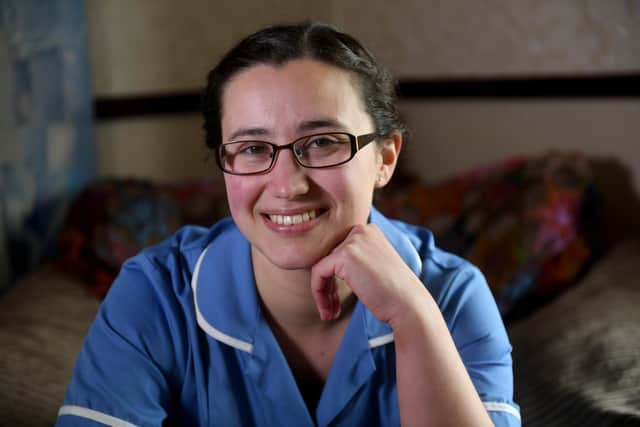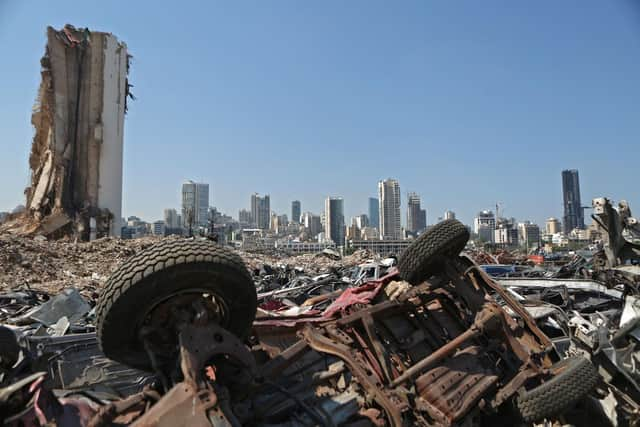From Leeds to Lebanon - How nurse's time facing Covid-19 in Beirut has supported her work in NHS
Matilda Willow was working as a nurse on an intensive care unit at Leeds General Infirmary when the rumblings of Covid-19 first began. She had just finished a diploma in tropical nursing but never did she imagine that she would be putting some of what she had learnt into practice quite so soon - nor in a hospital here in the UK.
“It was a very strange and difficult time for all of us,” the 27-year-old reflects. “I had just finished the diploma and we had been talking about Ebola and treatment for Ebola and the separation of patients and then suddenly we had this virus where we were having to do very similar things to what I’d been learning about but in an NHS hospital. I never thought I’d be putting that knowledge into practice in an NHS environment.”
Advertisement
Hide AdAdvertisement
Hide AdWith hopes since training to be a nurse years earlier of one day working overseas in a humanitarian crisis, she had signed up to the diploma to help herself be better equipped to work in challenging circumstances abroad, contributing to global health.


Within months of its completion, she was fighting Covid-19 in Lebanon with a frontline medical aid charity. That charity, UK-Med, is highlighting how doctors and nurses who have returned from international emergency medical responses bring back vital skills and experience to the NHS.
“I came back feeling part of a global picture and with more energy to keep fighting,” Matilda recalls, “especially as I know gains we make against Covid-19 here benefit colleagues in Lebanon and other places.”
Matilda spent two months in the country in the aftermath of the Beirut blast. In August 2020, a huge explosion in the capital killed at least 218 people, wounded 7,000 and left swathes of the city decimated. The UK Emergency Medical Team, which is the government’s frontline health response to disasters overseas, began work in Lebanon. UK-Med is a partner and


Advertisement
Hide AdAdvertisement
Hide AdMatilda joined their efforts in November 2020, responding to a surge in cases of Covid-19. “There was still a lot of signs of the damage caused by the blast, still a lot of people struggling with the consequences,” she says. “Because of the damage to the hospitals, because of people’s behaviour after the blast, the Covid cases were ramping up.”
Matilda, who lives in Farnley in Leeds, says she wanted to share some of the things the UK and NHS had learnt about the virus with healthcare staff overseas. Her time in Lebanon was spent supporting medical teams at four hospitals in Beirut, helping them to become better prepared to deal with Covid-19 and treat suffering patients.
“I was excited and nervous,” she says. “I really wanted to be able to go and contribute to something. But also, going for the first time out on a health response to a completely different country was something very, very new.
“The Lebanese staff that we were working with were fantastic. And a lot of the time, they were really well trained, and really well experienced, but they didn’t have that Covid experience. We were also working in a context where the healthcare system financially is a lot less well supported than it is here... It was a pleasure to work with the staff, to support them to do better, to achieve more.”
Advertisement
Hide AdAdvertisement
Hide AdMatilda was focused on the intensive care units; part of her role involved analysing and addressing issues in the hospitals to try to alleviate problems, make the workplace safer for staff and improve patient care.
“Culturally things were different; the way staff work with patients is different, the way that an ICU is arranged is completely different,” she says. “Because of the staff and equipment they have available, it’s more what I would think of as a high dependency environment, rather than an intensive care environment. High dependency is like one step down, but they were having to provide the top level of care just with this lower level of nurses, resources and equipment.”
The deployment was the first with UK-Med for Matilda, after she signed up to the organisation’s register during her tropical nursing diploma. She says she returned feeling more confident about responding when improvements are needed and with a greater understanding of how factors such as supplies, staff morale and wages can interact and impact on care delivery and patient safety. “I feel like I’ve come back as a better nurse,” she says.
Her thoughts echo those of many others, as captured in a report by UK-Med last year. ‘Global health responders - a shot in the arm for the NHS’ shines a light on the benefits NHS doctors, nurses and allied health professionals who have taken part in an international emergency medical response bring back for their practice and patients in the UK.
Advertisement
Hide AdAdvertisement
Hide AdThe charity is calling on policy makers, the NHS and the general public to recognise the dual benefits both to disaster affected communities and to the NHS.
“There is no health without global health, says Professor Tony Redmond, founder and chair of UK-Med. “The pandemic has shown just how quickly disease can spread and how our NHS must be trained and prepared for any eventuality. Experience gained in disasters and outbreaks by NHS staff fortifies our defences and increases our resilience.”
Matilda, who studied nursing at the University of Leeds, changing tack after originally beginning a languages degree and learning Arabic, recalls how the first wave of the pandemic was a “dark time”.
The specialist Neuro ICU where she was working began taking Covid-19 patients and staff were drafted in from other parts of the hospital to help with their care. “Compared to what we know now about what Covid does and how it acts and how to make people better, we were just working with next to nothing and a lot of our patients at first didn’t survive,” she reflects. “That was hard...But quite quickly our knowledge started to improve and our ability to deal with it started to improve.”
Advertisement
Hide AdAdvertisement
Hide AdMatilda now works as a specialist burns nurse at Pinderfields Hospital in Wakefield. She works with patients with smaller and more minor burns as well as those with major burn injuries and infections. Her experience in Lebanon has influenced how she views the NHS and its capabilities.
“When we think about healthcare systems, we tend to see them as huge systems slow to change,” she says. “In Lebanon, I saw how a group that is committed, purposeful, and working with the right people, and focusing on the smaller things, can make lots of small changes.”
“I think another thing I gained from Lebanon is having a different perspective,” she adds. “There’s problems in the NHS, with funding, with staffing, with all sorts of other issues, but seeing how much worse the problems could be made me come back feeling so much more positive about the environment that we work in and the work we can do.
“Yes we should be trying to continue to improve that but we should also be proud with what we have with the NHS and the level of care that we can give.”
Advertisement
Hide AdAdvertisement
Hide AdSupport The Yorkshire Post and become a subscriber today. Your subscription will help us to continue to bring quality news to the people of Yorkshire. In return, you'll see fewer ads on site, get free access to our app and receive exclusive members-only offers. Click here to subscribe.
